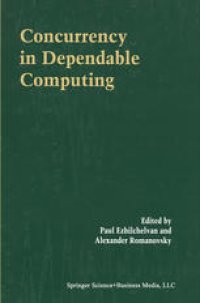
Ebook: Concurrency in Dependable Computing
- Tags: Data Structures Cryptology and Information Theory, Computing Methodologies, Document Preparation and Text Processing, Processor Architectures
- Year: 2002
- Publisher: Springer US
- Edition: 1
- Language: English
- pdf
Concurrency in Dependable Computing focuses on concurrency related issues in the area of dependable computing. Failures of system components, be hardware units or software modules, can be viewed as undesirable events occurring concurrently with a set of normal system events. Achieving dependability therefore is closely related to, and also benefits from, concurrency theory and formalisms. This beneficial relationship appears to manifest into three strands of work.
Application level structuring of concurrent activities. Concepts such as atomic actions, conversations, exception handling, view synchrony, etc., are useful in structuring concurrent activities so as to facilitate attempts at coping with the effects of component failures.
Replication induced concurrency management. Replication is a widely used technique for achieving reliability. Replica management essentially involves ensuring that replicas perceive concurrent events identically.
Application of concurrency formalisms for dependability assurance. Fault-tolerant algorithms are harder to verify than their fault-free counterparts due to the fact that the impact of component faults at each state need to be considered in addition to valid state transitions. CSP, Petri nets, CCS are useful tools to specify and verify fault-tolerant designs and protocols.
Concurrency in Dependable Computing explores many significant issues in all three strands. To this end, it is composed as a collection of papers written by authors well-known in their respective areas of research. To ensure quality, the papers are reviewed by a panel of at least three experts in the relevant area.
Concurrency in Dependable Computing focuses on concurrency related issues in the area of dependable computing. Failures of system components, be hardware units or software modules, can be viewed as undesirable events occurring concurrently with a set of normal system events. Achieving dependability therefore is closely related to, and also benefits from, concurrency theory and formalisms. This beneficial relationship appears to manifest into three strands of work.
Application level structuring of concurrent activities. Concepts such as atomic actions, conversations, exception handling, view synchrony, etc., are useful in structuring concurrent activities so as to facilitate attempts at coping with the effects of component failures.
Replication induced concurrency management. Replication is a widely used technique for achieving reliability. Replica management essentially involves ensuring that replicas perceive concurrent events identically.
Application of concurrency formalisms for dependability assurance. Fault-tolerant algorithms are harder to verify than their fault-free counterparts due to the fact that the impact of component faults at each state need to be considered in addition to valid state transitions. CSP, Petri nets, CCS are useful tools to specify and verify fault-tolerant designs and protocols.
Concurrency in Dependable Computing explores many significant issues in all three strands. To this end, it is composed as a collection of papers written by authors well-known in their respective areas of research. To ensure quality, the papers are reviewed by a panel of at least three experts in the relevant area.
Concurrency in Dependable Computing focuses on concurrency related issues in the area of dependable computing. Failures of system components, be hardware units or software modules, can be viewed as undesirable events occurring concurrently with a set of normal system events. Achieving dependability therefore is closely related to, and also benefits from, concurrency theory and formalisms. This beneficial relationship appears to manifest into three strands of work.
Application level structuring of concurrent activities. Concepts such as atomic actions, conversations, exception handling, view synchrony, etc., are useful in structuring concurrent activities so as to facilitate attempts at coping with the effects of component failures.
Replication induced concurrency management. Replication is a widely used technique for achieving reliability. Replica management essentially involves ensuring that replicas perceive concurrent events identically.
Application of concurrency formalisms for dependability assurance. Fault-tolerant algorithms are harder to verify than their fault-free counterparts due to the fact that the impact of component faults at each state need to be considered in addition to valid state transitions. CSP, Petri nets, CCS are useful tools to specify and verify fault-tolerant designs and protocols.
Concurrency in Dependable Computing explores many significant issues in all three strands. To this end, it is composed as a collection of papers written by authors well-known in their respective areas of research. To ensure quality, the papers are reviewed by a panel of at least three experts in the relevant area.
Content:
Front Matter....Pages i-xvii
Front Matter....Pages 1-1
Compositional Development in the Event of Interface Difference....Pages 3-22
Model-Based Design of Dependability....Pages 23-40
TLA Specification of a Mechanism for Concurrent Exception Handling....Pages 41-59
Component Based Dependable System Modelling for Easier Verification....Pages 61-83
Front Matter....Pages 85-85
Digging into Concurrency....Pages 87-104
Deadlock Free Control in Automated Guided Vehicle Systems....Pages 105-126
Quality Analysis of Dependable Information Systems....Pages 127-145
Front Matter....Pages 147-147
Fault-Tolerant Sequencer....Pages 149-167
QoS Analysis of Group Communication Protocols in Wireless Environment....Pages 169-188
Semantically Reliable Broadcast....Pages 189-207
Exception Handling in Timed Asynchronous Systems....Pages 209-227
Front Matter....Pages 229-229
A recovery model for cooperative computations....Pages 231-251
Group Transactions....Pages 253-271
Checkpointing in Distributed Computing Systems....Pages 273-289
Front Matter....Pages 291-291
Concurrency in Dependable Real-Time Objects....Pages 293-310
Concurrency in Dependable Computing focuses on concurrency related issues in the area of dependable computing. Failures of system components, be hardware units or software modules, can be viewed as undesirable events occurring concurrently with a set of normal system events. Achieving dependability therefore is closely related to, and also benefits from, concurrency theory and formalisms. This beneficial relationship appears to manifest into three strands of work.
Application level structuring of concurrent activities. Concepts such as atomic actions, conversations, exception handling, view synchrony, etc., are useful in structuring concurrent activities so as to facilitate attempts at coping with the effects of component failures.
Replication induced concurrency management. Replication is a widely used technique for achieving reliability. Replica management essentially involves ensuring that replicas perceive concurrent events identically.
Application of concurrency formalisms for dependability assurance. Fault-tolerant algorithms are harder to verify than their fault-free counterparts due to the fact that the impact of component faults at each state need to be considered in addition to valid state transitions. CSP, Petri nets, CCS are useful tools to specify and verify fault-tolerant designs and protocols.
Concurrency in Dependable Computing explores many significant issues in all three strands. To this end, it is composed as a collection of papers written by authors well-known in their respective areas of research. To ensure quality, the papers are reviewed by a panel of at least three experts in the relevant area.
Content:
Front Matter....Pages i-xvii
Front Matter....Pages 1-1
Compositional Development in the Event of Interface Difference....Pages 3-22
Model-Based Design of Dependability....Pages 23-40
TLA Specification of a Mechanism for Concurrent Exception Handling....Pages 41-59
Component Based Dependable System Modelling for Easier Verification....Pages 61-83
Front Matter....Pages 85-85
Digging into Concurrency....Pages 87-104
Deadlock Free Control in Automated Guided Vehicle Systems....Pages 105-126
Quality Analysis of Dependable Information Systems....Pages 127-145
Front Matter....Pages 147-147
Fault-Tolerant Sequencer....Pages 149-167
QoS Analysis of Group Communication Protocols in Wireless Environment....Pages 169-188
Semantically Reliable Broadcast....Pages 189-207
Exception Handling in Timed Asynchronous Systems....Pages 209-227
Front Matter....Pages 229-229
A recovery model for cooperative computations....Pages 231-251
Group Transactions....Pages 253-271
Checkpointing in Distributed Computing Systems....Pages 273-289
Front Matter....Pages 291-291
Concurrency in Dependable Real-Time Objects....Pages 293-310
....








